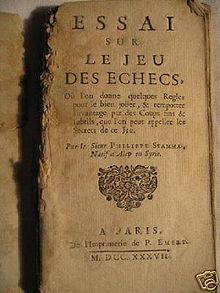
- Chess World Cup
- FIDE Grand Prix
- Olympiad
- World Championship
- List of strong tournaments
- List of world championships

- Checkmate patterns
- Chess openings
- Chess strategy
- Chess tactics
- Chess theory
- Endgames
- Pawn structure
- Problems/Compositions












| Country | England |
|---|---|
| Born | c. 1705 Aleppo, Aleppo Eyalet (Ottoman Syria), Ottoman Empire |
 Essai sur le jeu des echecs
Essai sur le jeu des echecsPhilipp Stamma (c. 1705 - c. 1755), a native of Aleppo, Ottoman Syria, later resident of England and France, was a chess master and a pioneer of modern chess. His reputation rests largely on his authorship of the early chess book Essai sur le jeu des echecs published 1737 in France (English translation: The Noble Game Of Chess 1745). This book brought the Middle Eastern concept of the endgame to the attention of Europe and helped revive European interest in the study of the endgame.
Stamma died in London c. 1755, with two sons surviving him.
Stamma was a regular at Slaughter's Coffee House in St. Martin's Lane (London), a center of 18th century English chess, and was considered one of England's strongest players. He was defeated quite handily by Philidor in a famous match in 1747, which marked the beginning of Philidor's rise to fame.
Apart from the higher skills of Philidor, this defeat could also be justified by the fact that, as Ludwig Bledow and Oppen suggested, Stamma, in Ottoman Syria, was used to playing with the Arabic rules and only after his arrival to Europe got acquainted with the Western rules.
(Stamma) als Schachmeister noch nicht anerkannt und bekannt genug, der Spielregeln im Occident weniger kundig war.
{(Stamma) as a chess master not yet recognized and well known enough, was less acquainted with the rules in the West.}
It is not clear, however, how much this statement is true and how much it depended on the evident sympathy that Bledow and von Oppen had for Stamma.
Ich glaubte früher, dass Stamma sich niemals mit Philidor in einen Wettkampf eingelassen habe, dem widersprechen aber namhafte Autoritäten: Sarrat treatise, Th. 1. S. xvii., Walker in seiner Ausgabe des Philidor, S. xvi., auch der Palamède, Th. 1. S. 180. Allerdings berichten nur Biographen des Philidor die Thatsache und weichen in Angabe der Bedingungen von einander ab, auch schrieb einer dem Ändern nach, man könnte daher noch an der Richtigkeit und dem Resultate, wie es referirt wird, zweifeln, für wahrscheinlich aber muss man es jedenfalls halten, dass Stamma im Nachtheil geblieben sei;, denn Philidor repräsentirte die Wissenschaft, Stamma das Genie, welches, selbst besiegt, mehr bewundert wird als ein regelrechtes System, das doch auch nicht überall und nicht unbedingt ausreicht.
{I formerly thought that Stamma never played with Philidor this match. This opinion of mine, however, contradicted the well-known authorities: Sarrat's treatise, Th 1st P. xvii., Walker's book on Philidor, p. xvi and also the Palamède, Th 1st P. 180. Although the event is reported only by Philidor's biographers, who differ and contradict one another in indicating the conditions of the match, and one could also have some doubts about the result in the way it is reported. But probably one needs to accept, at least, that Stamma had remained in disadvantage. Therefore, Philidor represented the Science and Stamma the Genius, which, although defeated, is more brilliant than a system of rules, but not always sufficient to win.}
Stamma's book introduced algebraic chess notation in an almost fully developed form before the now obsolete descriptive chess notation evolved. Philidor's writings had more influence after his victory over Stamma, and the descriptive system based on Philidor's approach was dominant for a long time. The main difference between Stamma's system and the modern system is that Stamma used p for pawn moves and the original file of the piece (a through h) instead of the initial letter of the piece.
His name is attached to the Stamma Gambit in the King's Gambit (1.e4 e5 2.f4 exf4 3.h4), and Stamma's mate, a rather rare checkmate.
In November 2015 appears a new edition of the essay of Philippe Stamma of 1737 adapted in contemporary French entitled Les cent fins de parties de Philippe Stamma.